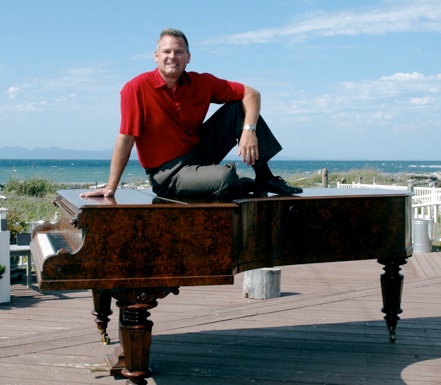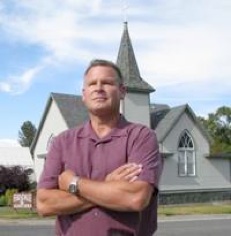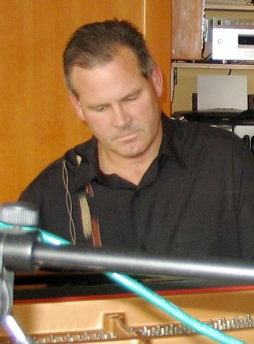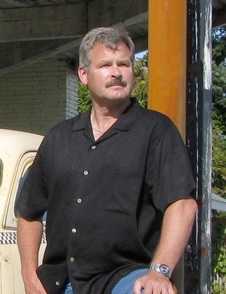I was first introduced to Jon Mutchler and his music in early 2002, when he sent me “Prone to Wander,” a collection of original arrangements of hymns, and “Piercing the Heart,” a collection of standards and show tunes, for review. I was very impressed with his music and playing, and we became internet friends. I found it fascinating to learn that Jon is the pastor of his own church, a piano teacher, and the father of seven kids. Knowing that, it wasn’t surprising that almost five years went by before “Incarnation,” a CD of Christmas improvisations, was released; it became one of my favorite Christmas CDs. A few months ago, Jon emailed me that he had two new CDs to review - a second CD of hymns (“Still Prone to Wander”) and a tribute to his sister and her husband and their oceanside retreat in northern Washington State (“La Place Sur La Mer”). I decided that an interview with Jon was long-overdue, so here it is!
KP: We hadn’t heard too much new from you for a couple of years, and then suddenly you have two new albums, “Still Prone To Wander” and “La Place Sur La Mer,” released very close together. Did you have a sudden burst of inspiration or something? Let’s talk about the two albums.
Mutchler: Kathy, as I think about the answer I realize that I've been working on three CDs these last couple of years. As you know, my Christmas album ("Incarnation: Nativity Reflections") came out in late 2006. At the same time, I was also working hard on a special project, "La Place Sur La Mer" (“The Place by the Sea”). This is a CD I conceived in early 2006 as a work to celebrate and express my joy at my sister's success at opening a beach-side retreat of that same name near Port Angeles, WA (
www.MagicalBeach.com). My sis, Lyndee, has always been a supporter and friend of my music and I desired to do a project that focused on the special life she and her husband enjoy and share at La Place.
However, that album took much longer than I had planned. The creative process took more twists and turns than I anticipated and since most of the material is original, it took more time to get it "just right." It reminds me of Beethoven, who would often labor and rework pieces to get them as he wanted--writing and rewriting. Thus, he produced only nine symphonies and five piano concertos compared to Mozart, who gave us 40 and 20, respectively, AND died 22 years younger. No, I'm not Beethoven, but I felt I understood what he went through--trying to get things "just right." So, it took a while.
Anyway, I was finally wrapping up “La Place Sur La Mer” this summer when I began to reflect on the milestone of our church's (and my ministry's) 20th anniversary. That inspired me to do a second album of hymns (in 2001 I released “Prone to Wander”) to mark that special occasion . I got my Yamaha C7 tuned, set up my studio, sent my family out of town for a vacation, and in four days in July, “Still Prone to Wander” was born. It was such a beautiful and satisfying experience to have a project flow so easily. As a result, both projects went to press at the same time, but they're very different. That should explain why.
KP: Tell us about the music on each album.
Mutchler: About half of “La Place Sur La Mer” is original songs, improvisations, and reflections on my sister Lyndee's home and the geography of the area. Some of the titles include “Lyndee's Garden,” “Twilight at Freshwater Bay,” and “Orca: Black and White.” You have described these tunes well in your review. There are another five or six cover tunes that fit the theme of the album as well, including works by Gershwin and The Beatles. Lyndee and Allen's wedding song was Seals and Croft’s “Summer Breeze,” and I've included my interpretation of it.
On “Still Prone to Wander,” I chose hymns that most people know and that are common to most church traditions: “The Doxology;” “A Mighty Fortress;” “Come, Thou Fount of Every Blessing;” “We Gather Together.” I've recorded them differently than I've ever heard them done before. I sort of cut loose, broke free, and decided to play FOR ME and not for someone else. Perhaps, in a sense, I was playing for God, because in “Still Prone” I express my greatest range of emotions and passions on the piano. One example, I think, is the hymn, “I Need Thee Every Hour.” To me, it sounds like I am playing as if praying to God - with earnestness, honestly, and longing for Him. Anyway, there wasn't any planning for this CD. I just sat down, recorded, and this is what occurred. It was a very profound experience. I was taken aback with what came out.
KP: Both albums are great, but “Still Prone” is very powerful both musically and emotionally. You did an exceptional job with it. How did you do the cover for “La Place”? You didn’t really put that grand piano in the surf, did you?
Mutchler: Ah, no! There’s a little Photoshopping going on. The piano is my sister's rare 1883 Bechstein piano and the beach is also hers out at La Place near Port Angeles, WA.
KP: You wear an amazing number of hats. You are an incredible musician, you are the pastor of your church, you teach piano lessons, you perform regularly at a resort/restaurant (
www.Semiahmoo.com) , and you’re “Dad” to seven kids. Do you ever sleep?
Mutchler: Ha! I sleep very well as a result of the full days I pull! I do have a full but wonderfully satisfying and interesting life. I haven't found anyone I'd trade with! I am very blessed to do so many things I like. By the way, my wife (a former school teacher) and I also home school all seven kids. It's quite a life!
KP: Where in Washington is Ferndale?
Mutchler: Ferndale is on the main interstate in Washington, I-5. We are about 90 minutes north of Seattle and about 20 minutes south of the Canadian border. We live in a home we built as a family in 2004. From our windows we can see much of British Columbia.
KP: Have you been in Ferndale for a long time?
Mutchler: Diane and I have been in Ferndale 21 years. We both originated from Kitsap County - Bremerton and Poulsbo, WA - and met in high school.
KP: What inspired you and your wife to start your own church?
Mutchler: Before we moved to Ferndale, I was attending seminary in Vancouver, British Columbia. We were newlyweds and lived in Blaine, WA (a border town near Ferndale) from where I commuted to school. We were part of a sweet congregation in Blaine that asked us, after graduation, to start a sister church in Ferndale. The idea of staying in NW Washington appealed to us, along with the challenge and opportunity of serving our own congregation, so we accepted. As I mentioned earlier, we just marked our 20th anniversary.
KP: How did your music fit in with that?
Mutchler: Diane and I were self-supporting when we started the Ferndale Alliance Church. Diane was a public school teacher and I taught and performed piano. Although the church has now become a full-time work, I still enjoy a very active music career. So, in short, music has always helped pay the bills of our large family.
KP: When did you start playing the piano?
Mutchler: I grew up in a musical family. My father, Ralph D. Mutchler, was a successful musician and jazz educator, so all the Mutchlers took piano lessons. I started at age six. Nadean Clarke was my first teacher. A song I composed for her, “Nadean,” is featured on “La Place Sur La Mer.” It is a modern work, but I tried to give it a Chopin-like feel in terms of melody and construction, but with more modern chord changes. I completed the work a few weeks before she passed away in 2006.
KP: She must have been enormously moved by that!
Mutchler: Sadly, she didn't get to hear it, except from heaven!
KP: How long did you take lessons?
Mutchler: Kathy, I still take lessons! After high school (where I focused mostly on my jazz playing), I continued lessons at college and university and earned a music degree, meeting the requirements in two areas: piano performance (classical) and jazz studies. I still take an occasional lesson when I'm working on a large classical work with my former teacher at WWU, Ford Hill (
http://jonmutchler.com/ludwig.html) who lives nearby.
I think it is so important to keep learning and growing. One of the biggest complaints about musicians is that they stop maturing. They grow old and stagnant. I keep trying to learn new works and go to a variety of concerts when I can. (In fact, an hour ago I returned from a fabulous performance of Spanish piano music, performed by Brazilian pianist, Geisa Dutra). Also, I think we need to embrace all styles of piano music: classical (all periods), jazz, popular, and modern. I try to attend a concert of some kind (classical or jazz) monthly.
KP: Let’s talk a little about your style of playing.
Mutchler: Kathy, when I post my music on CD Baby, iTunes, or Amazon, I always struggle with what to call it. Jazz? Pop? New Age? Sacred? I know that people who like jazz, popular, gospel, and new age music enjoy what I do. Perhaps I can say that my music is a fusion of classical and jazz, popular and sacred, improvised and structured. I value rich and interesting harmonies, and also complex but satisfying rhythms. I always strive to say something "new." I think creativity is one of the most divine gifts that God gives us. As a side note, that is one reason I'm not terribly thrilled with the video game, “Guitar Hero.” It is a musical game based entirely on imitation: Playing note for note, someone else's music. That's fine for what it is, but I want to hear something new! Change it! Make it your own. Create! I encourage my students to improvise. (My dear mom called it, "pounding!" when I was growing up. I call it music!)
KP: How long have you been teaching piano lessons? Do you teach from your home?
Mutchler: I've been teaching about 23 years. I have beautiful and spacious teaching and recording studio in my home. I currently have about 25 students.
KP: In reading your website, you say you stay pretty strictly classical in approach to lessons at least for less-advanced students, but you teach a lot of different kinds of music. I always find that I get much better results from students who are playing music they really enjoy and can relate to. I also find that many students naturally gravitate to classical music as they become more advanced if it isn’t shoved down their throats from the beginning. Has that been your experience as well?
Mutchler: I need to take a look at my web site. I may be communicating something I had not intended. Younger kids like familiar music and that's a great place to start. Get them to love the piano first, then start to teach them the rich repertoire that so wonderfully belongs to the world of piano. I also use many of the popular and well-written methods available (Faber, Alfred, Bastien).
KP: What do you see in the future for classical music?
Mutchler: Wow, that's a good question. What do you think, Kathy? I'm not sure. One of my goals when I teach and perform is to convey just how marvelous the music of the masters truly is. Very special indeed and so unappreciated by our children and adults in this generation (especially in the USA). Currently I'm working on the last two Schubert piano sonatas (A Major and Bb Major). Frankly, these works are heavenly and near-perfect compositions. It’s tragic that Schubert died so young and didn't leave us any concertos. When I play works like these for students, I explain that the music they are enjoying today (even rock and roll) flowed from the harmonic, structural, and rhythmic genius of these great European composers.
As an example, sometimes I use the pounding introduction and portions of the first movement of Beethoven's “Waldstein” piano sonata (opus 53) to show that "rock and roll" rhythms have been around a long time! We as teachers need to teach this - not just because of tradition, but because the music is truly wonderful and worth knowing. And we should learn the music ourselves. Whether we are pop, jazz, new age, or church pianists, we should immerse ourselves in the classical literature. There is a wide range of ability levels - something for each of us! It will improve all aspects of our preferred styles of playing.
KP: Do you have any thoughts on so-called “New Age” piano?
Mutchler: If anything, I wish there was more variety to it. There is a lot of imitation and repetition. Much of it is interchangeable, and it is often difficult to tell one performer/composer from another. It's wonderful music to listen to and can bring calm and relaxation. Perhaps my main concern is that it seems to me to be limited to a narrow aspect of human emotion and feeling. As I listen to it , I feel a certain category of sentiments are being expressed - those of peace, calmness, serenity - whereas I have found jazz and classical music to hit a much wider range of genuine human and spiritual experience: joy, laughter, rage, passion, anger, longing, conflict, loss.
In classical music, we have highly emotional piano pieces such as Beethoven's “Apassionata" (passion), "Tempest" (storm), and "Les Adieux" ("The Goodbye") sonatas, Chopin's “Revolutionary Etude,” or (the piano version) of Stravinski's "Petrouska" for just a few examples. Although I enjoy listening to new age music (George Winston calls it "folk piano music" -- a better term, I believe), I wonder what will endure, say, 100 years from now. I am hoping "new ground" will be broken by some of the leading new age performers.
KP: Are you a good sight-reader? Do you also play by ear?
Mutchler: I am trained in both jazz and classical, so I can, of course, read notes and chord changes. I can get through most things that are put in front of me. Next week I'm backing up singer/actress Bernadette Peters with an orchestra. She has a large piano book, but it all looks pretty familiar because I've been playing for most of my life. After a while, there are patterns that keep showing up over and over and aren't hard to pick up. I often get new students who want to learn to improvise or play new age or contemporary sacred music. That's fine, but I still urge people to keep up and improve their reading, and so I still assign written music to those folks (usually adults).
Regarding playing by ear: Since high school I've been transcribing music for recordings, so I developed a decent ear early. As a side note and plug: I encourage my older students to listen to Whisperings: Solo Piano Radio and PLAY ALONG with what they hear.
Most of the music is relatively simple in chord structure and not too fast. Since chord patterns repeat quite a bit (many of the tunes may only have 3-5 chords), my students can play along with that. It helps them learn new chords and voicings. (Thank you, David Nevue, for your fabulous service!)
KP: Have you performed at many Whisperings concerts?
Mutchler: I did one last August and I enjoyed it very much. It was in Bellingham, with Joe Bongiorno, Joe Yamada, and Louis Landon. It was the first time I’d met these fine gentlemen. They're terrific musicians and great guys. They're all dads, which gave us much to chat about afterwards at the local IHOP. Whisperings is a wonderful organization.
KP: Do you also head up the music department for your church, or are you able to delegate that to someone else?
Mutchler: We are a small community church of about 100 people, so there aren't too many "departments." We have a small worship band with several fine musicians (two are my kids!), and I'm in this group that provides worship music each Sunday. It's a terrific time to be a church musician. There is so much creative music out there now.
KP: When you play at the Semiahmoo resort, do you have arrangements of popular songs that you stick to or do you do a lot of improvising? Do you take requests?
Mutchler: When I play piano at Semiahmoo I try to stick mostly to familiar music: pop and show tunes, etc. But, I try to change tunes each time I play them: new chords, new key, even a new style. Sometimes, for a good exercise, I try to play the piece with just the left hand. I need to fight boredom, so I try to keep the creative juices going, even if I'm doing cover tunes.
While we're on this I would love to invite readers to visit me at Semiahmoo (
www.Semiahmoo.com) sometime. I've been there twelve years and play Friday and Saturday nights in their restaurant called Stars. Oh, I forgot to mention, that I play some classical music there as well. It's a classy place, and “The Moonlight Sonata” always works well!
KP: Who and/or what are your biggest musical influences?
Mutchler: Boy, there are a lot. As a young pianist I gobbled up everything by Bill Evans, Keith Jarrett, Herbie Hancock, and McCoy Tyner. In college, I became enthralled with the creative genius of Beethoven, Chopin, Schubert, and Mozart, as well as later composers like Debussy, Barber, Rachmaninoff, Copland. There are more, including a handful of truly great American songwriters that we should all be familiar with: Gershwin, Richard Rodgers, Jerome Kern, Duke Ellington, Cole Porter. I especially thank my late father, Dr. Ralph Mutchler, who introduced me to the American song book. In recent years I've appreciated the songwriting skills of McCartney and Lennon and hope someday to do an all-Beatles CD.
KP: Let’s give your sister’s place a shameless plug. Tell us about it.
Mutchler: Thank you for asking about that. She is a wonderful and interesting person. There’s never a boring moment with her. She's smart, clever, and kind. And she is a fabulous host and caretaker of La Place Sur La Mer. She and her doctor husband, Allen, purchased this beautiful waterfront home after Allen retired from his medical practice in the Bay Area (San Mateo). They have turned it into a fabulous retreat, destination, wedding venue, and romantic getaway. It is well worth the visit. She has an easy web site to remember: MagicalBeach.com.
KP: What’s up next for you?
Mutchler: I don't have any current CD projects in the works. I have an idea for a book (on church life) that I'd like to get at. As I mentioned earlier, Diane and I homeschool our seven children and I desire to focus some more energies there. Several of them are becoming budding musicians and that's a lot of fun. Also, I have been challenged by my former college professor to write out some piano music, namely, a set a variations (difficult, more advanced) on the hymn, We Gather Together. I'd like to do that as my next serious musical effort. I am also interested in doing a classical concert, something I've not done in years. It's not my strongest area, but it's so wonderfully rewarding that I'd like to do it. I also teach each summer at the Blaine Jazz Festival (piano, combo, and jazz theory), and always try to provide some original music for that. So, I need to start thinking about that before summer sneaks up! (
www.BlaineJazzFestival.com).
Many thanks to Jon Mutchler for taking the time to talk to us about his life and music. Be sure to visit
his website and his
Artist Page here on MainlyPiano.com.
Kathy Parsons
November 2008




